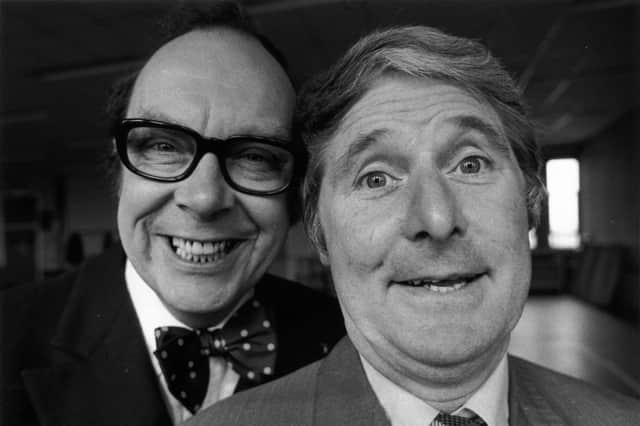Conservative party conference: For Kwasi Kwarteng and Lis Truss read Eric Morecambe and Ernie Wise, but not in a good way – John McLellan


That the description comes not from political opponents but, according to the Sunday Times, from senior Conservatives says everything about a party which should be playing from the same score ahead of the next general election, having defenestrated a Prime Minister who had gone from electoral genius to liability in the space of a year.
Before Mr Kwarteng took to the stage at the Birmingham conference yesterday, out went the abolition of the 45p income tax bracket in the face of open revolt and a gargantuan task to make the Tory orchestra produce a tune along with which enough voters are prepared to whistle.
Advertisement
Hide AdAdvertisement
Hide AdWith the pound back up to pre-mini budget levels, there are clear signs the markets are settling, but it’s hard to remember as big a confidence collapse in such a short space of time, and turning around a polling deficit of 33 points in under two years would take every ounce of skill from master communicators.
But what the leadership contest and the events of the last week have proved beyond all reasonable doubt is that, on a good day, Liz Truss might be a competent messenger, but compelling and charismatic are not adjectives which immediately spring to mind. Now the opposition will pile in with lame and duck.
I didn’t vote for her, but after the Prime Minister’s energy crisis announcement, I had hopes that after her conference address tomorrow morning we members would leave with a spring in our step, enthused for the challenge ahead, but now the best we can hope for is to feel slightly less daunted.
None of us disagree with the core principles of low tax, small-state Conservatism, but that comes with a presumption of prudence which Gordon Brown was able to claim because he followed the successful Conservative approach he inherited in 1997.
Instead, Ms Truss needs both an oratorical and economic transformation of miraculous proportions in 18 months, before what some pollsters believe could be an electoral Armageddon on a par with the 1993 Canadian election when Prime Minister Kim Campbell took her Progressive Conservatives from a ruling group of 156 seats to two.
This time last year, Boris Johnson could get away with a barn-storming 40-minutes of political stand-up which actually said very little because he was, well, Boris. The entertainment factor was enough to send the faithful home with at the very least a smile on their faces, but even the most loyal Trussite won’t argue she’s box office for anyone other than the most committed, despite her best efforts at Sunday night’s gala reception.
The one thing members and the rest of the country wants to know is how it’s all going to work, and that relies almost entirely on trust in Truss and a collective instinct that somehow it will all come good, because the tax cuts and pro-growth measures haven’t even started their journey through Parliament, never mind being close to implementation.
Nor will her speech tomorrow detail the public spending controls needed to convince the markets the books are being balanced because she’s already insisted that won’t happen before Chancellor Kwarteng’s next statement on November 23.
Advertisement
Hide AdAdvertisement
Hide AdAlong with Treasury orthodoxy, her government has thrown out basic principles of political nous and communication, instead adopting a novel reinterpretation of the Royal Family’s principles in which the strategy appears to be “never explain but always complain”.
It is true the intention to cut tax was heard loud and clear over the summer, but what the markets expected was some explanation about how it would be funded, and without answers it’s no wonder sceptics filled the void and bond markets reacted accordingly.
It was a gift for the Labour conference and even the U-turn on the top rate of tax might not be enough to shake off the ‘reverse Robin Hood’ label if the heavily trailed cut in real-terms welfare payments is announced in the November statement.
Had the Cabinet been asked, the removal of the 45p top income tax band would probably never have been mentioned, and while the £2 billion it saves might not have stopped the markets being spooked by the huge borrowing, at least the government could have spent the last week pointing to the new lower income tax rate and the scrapping of the National Insurance rise as genuine help for all working people.
Together with the allegation that the Chancellor met hedge fund managers at a party only hours after delivering the mini-budget, it saddled thousands of decent Conservatives with a characterisation which is neither fair nor accurate. Now we start again.
It's all very well for Ms Truss to concede “they should have laid the ground better”, but this failure means she’s earned no credit whatsoever for pumping billions into the economy to limit the damage caused by soaring energy costs.
To spend billions slashing tax and capping bills for millions of ordinary people and to be rewarded with a catastrophic loss of public confidence takes some doing.
Compare that to the political impact of defeated rival Rishi Sunak’s pandemic rescue packages and the difference is stark; in April 2020, YouGov put Conservative support on 52 against Labour’s 28, so between Johnson and Truss last week’s 54-21 lead for Labour actually represents a jaw-dropping 57-point swing.
Advertisement
Hide AdAdvertisement
Hide AdAs someone who voted Remain, Hunt and Sunak, maybe my judgement isn’t the most reliable, and to that can be added my hunch in last week’s column that there could be a snap election campaign on the back of gratitude for decisive action on energy costs. The only feelgood factor coming from the government just now is reminding us of old Morecambe and Wise sketches.
Comments
Want to join the conversation? Please or to comment on this article.

